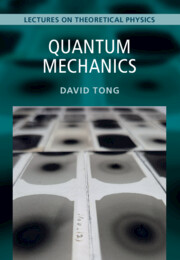Refine search
Actions for selected content:
2 results

Quantum Mechanics
- Lectures on Theoretical Physics
-
- Published online:
- 27 June 2025
- Print publication:
- 19 June 2025
-
- Textbook
- Export citation
Chapter 5 - Quantum Mechanics As the Ultimate Mode of Symbol Formation
- from Part I - Cassirer’s Philosophy of Culture
-
-
- Book:
- Interpreting Cassirer
- Published online:
- 17 April 2021
- Print publication:
- 01 April 2021, pp 89-108
-
- Chapter
- Export citation
